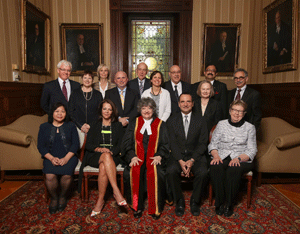
Ronald Caza has never been one to shy away from a fight when it comes to defending the rights of Canada’s linguistic minorities.
 The Ottawa lawyer is currently representing francophone teachers and parents in a legal battle with the government of New Brunswick over funding for the province’s French speaking schools.
The Ottawa lawyer is currently representing francophone teachers and parents in a legal battle with the government of New Brunswick over funding for the province’s French speaking schools.
It’s one of many cases Caza has taken over the years that have focused on protecting the institutions of linguistic minorities.
Caza, who is a partner at CazaSaikaley LLP, was one of 14 legal professionals the Law Society of Upper Canada honoured Wednesday. Caza was given a Law Society Medal.
One of Caza’s most significant cases was a fight to keep the francophone Montfort Hospital open in Ottawa when the government of former Ontario premier Mike Harris was looking to close it down.
At the time, Montfort was the only Francophone teaching hospital in Ontario.
“There was a constitutional obligation to protect linguistic minorities, which included the protection of their institutions,” he says.
The Divisional Court and later the Ontario Court of Appeal determined the decision to close Montfort was unconstitutional as the hospital was an essential institution of the francophone community and shutting it would cause harm.
Since Montfort, linguistic minorities across the country have challenged governments’ decisions to close or impact their institutions, Caza says. The Montfort case set a number of precedents and also resulted in a number of Supreme Court decisions, which confirmed the constitutional rights of linguistic minorities, he added.
“It’s all about ensuring that the francophones across Canada outside of Quebec continue making efforts to preserve their language and culture and that they don’t basically assimilate,” he says.
Other honourees awarded a Law Society Medal included Peter Rosenthal, a social justice lawyer who is also a professor emeritus of mathematics at the University of Toronto.
Over the years, some of the people Rosenthal has represented included homeless people, G20 protesters, and members of First Nations — and all on a pro bono basis. Rosenthal says he never asks to be paid for his work, unless the people he represents have legal aid funding.
He is currently representing the “Neptune Four” — a group of four black teenage boys who are suing the Toronto Police after they were stopped, questioned and arrested at gunpoint near their homes on Neptune Drive in 2011. They alleged the police acted out of racial bias.
Rosenthal first became interested in the law when he was arrested at an anti-Vietnam war protest in 1969. He became a paralegal for a couple of decades before eventually deciding to go to law school and was called to the bar in 1992.
“My interest in the law has been to promote social justice issues,” he says.
Rosenthal represented Miguel Figueroa, the former leader of the Communist Party of Canada, in Figueroa v. Canada (Attorney General), a case that successfully challenged part of the Elections Act that deregistered political parties if they had less than 50 candidates run in a general election.
The Supreme Court of Canada ruled in favour of Figueroa, which Rosenthal says was significant, as it would ensure supporters of small political parties could get tax deductions for financial contributions.
“It makes a big difference to the amount of support parties get financially,” Rosenthal says.
The Law Society also awarded its Laura Legge Award to Lisa Borsook, an executive partner at WeirFoulds LLP, and one of the first women named a managing partner at a large Ontario law firm.
Borsook was recognized for her work advancing the interests of women lawyers in Ontario. When she first became a managing partner, Borsook says she hoped it would show other women what they could achieve.
Borsook first became a managing partner in 2006 and has mentored many colleagues over the years. “I think it’s important women lawyers have role models,” she says, adding that when she made partner it sent a message to women in the legal profession that they can achieve positions of prominence in their firm.
“Whoever asks, I try and find the time for them,” she added.
Borsook says gender imbalance in the legal profession is a problem that is not going to solve itself and that women must push hard and take risks to achieve their goals.
“I look forward to a time when we don’t need to have an award to celebrate women’s advocacy for women, but I am so honoured to receive this award,” she said in a speech Wednesday.